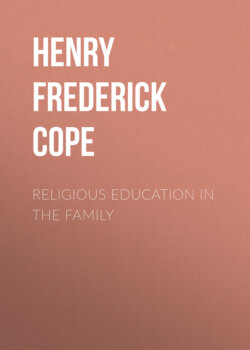Читать книгу Religious Education in the Family - Henry Frederick Cope - Страница 36
На сайте Литреса книга снята с продажи.
§ 7. IMPORTANT CONSIDERATIONS
ОглавлениеIt is worth while to insist upon two important considerations. Parents who stand as gardeners watching the growth of the tender plant of child-character may be looking for developments that never ought to come and will be disappointed because they were looking for the wrong thing. First, in watching for the beginnings of the religious life of the child in the family we are not expecting some new addition to the life, but rather the development of this whole life as a unity in a definite direction which we call religious. It is the first and most important consideration that religious education is not something added to the life as an extra subject of interest, but the development of the whole life into religious character and usefulness. Secondly, this growth of religious character is going on all the time. It is not separable into pious periods; it is a part of the very life of the family. Perhaps this increases the difficulty of our task, for it removes it from the realm of the mechanical, from that which is easily apprehended and estimated. It takes the task of the religious education of children out of the statistical into the vital, and reminds us that we are growing life every second, that there is never a moment when religious education is not in operation. This demands a consideration, not alone of lessons, of periods of worship and instruction, but of every influence, activity, and agency in all the family life that in any way affects the thinking, feeling, and action of the child. We are thinking of something more important than organizing instruction and exercises in religion in the home; we are thinking of organizing the family life for religious purposes, for the purpose of growing lives into their spiritual fulness.
Perhaps the capital mistake in the religious education of the family is that we overemphasize this or the other method and mechanism instead of bending every effort to secure a real religious atmosphere and soil in which young souls can really grow while we leave the process of growth more largely to the great husbandman. And the second great mistake is that we are looking for mechanical evidence of a religious life instead of for the development of a whole person. We must reinterpret the family to ourselves and see it as the one great opportunity life affords us to grow other lives and to bring them to spiritual fulness by providing a social atmosphere of the spirit and a constant, normal presentation of social living in spiritual terms.
